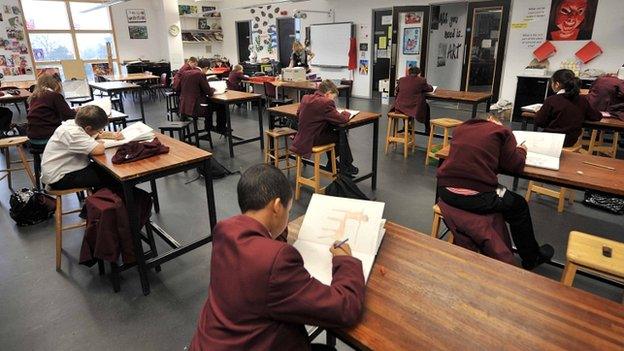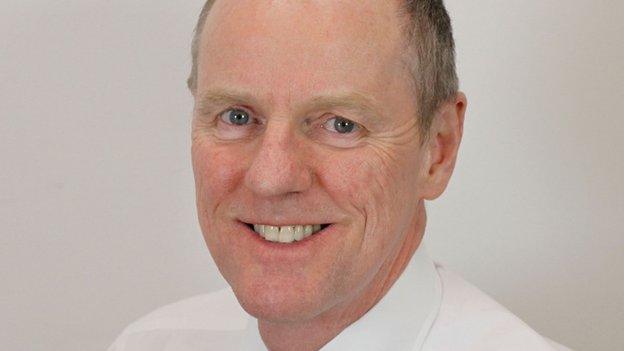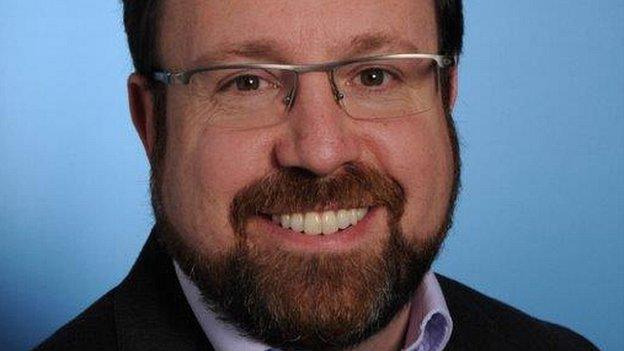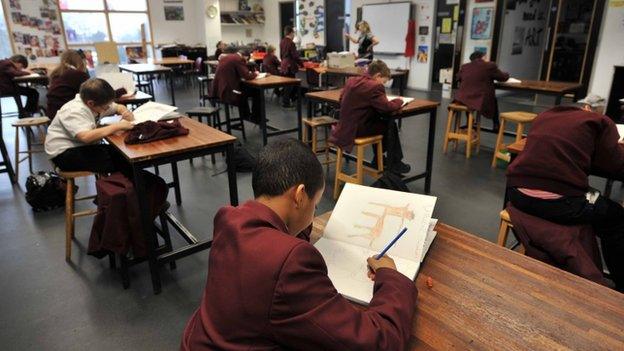Heads warn MPs of teacher shortage
- Published

Heads have warned MPs that teacher recruitment is now a "crisis"
Schools in England face a deepening problem in recruiting enough teachers, head teachers are warning.
The National Association of Head Teachers said 59% of schools advertising for teachers "struggled" to get applicants and a further 20% failed completely to appoint anyone.
Russell Hobby, leader of the NAHT, said it was clear evidence of a "crisis".
But the Department for Education said the number of teachers now stood "at an all-time high".
Labour said it was "time the government shook off its complacency".
The head teachers' findings, based on a survey of 2,100 school leaders, are the latest signs of recruitment difficulties facing schools.
Agency costs
Mr Hobby was among witnesses giving evidence to the Education Select Committee, which is investigating the extent of shortages.
Heads have blamed recruitment problems on negative attitudes towards the profession by successive governments and an erosion of teachers' pay.

Schools Minister Nick Gibb warned against "talking down the profession"
Mr Hobby told MPs that one of the biggest problems was the perception gap between schools and the government on the scale of the shortage.
The Schools Minister Nick Gibb told the committee that using language such as "crisis" over teacher shortages ran the risk of "talking down the profession".
Mr Gibb said rising numbers were entering teaching and the quality of the graduate intake was improving and this was not a profession with a "morale problem".
But Mr Hobby warned that national data could mask the reality on the ground, where schools were having to rely on temporary arrangements to cover for gaps.
The NAHT report also warns of the extra cost, with schools saying that agency fees to find teachers can cost £10,000 for a single appointment.
Emma Knights, chief executive of the National Governors' Association, said there was a "phenomenal cost" from recruitment fees, when schools were already "constrained by cost".
Professor John Howson told MPs that the problem was most acute in London and the home counties. The expert in the teaching jobs market has warned that the current shortage is the worst since 2001-02.
The committee heard claims that there were too many "piecemeal" approaches into teacher training - following a switch in emphasis from university education departments to training teachers in school.

Russell Hobby says national data can miss schools having to rely on short-term staffing
Kevin Courtney of the National Union of Teachers said there was a need for a more co-ordinated strategy - and said there was an impression that the government was "running down" university training.
James Noble-Rogers from the Universities Council for the Education of Teachers said universities needed to be able to make more long-term plans for the number of teacher training places they could offer.
There were also suggestions that an incentive to enter teaching could be to pay off tuition fee debt - but Mr Gibb said that bursaries, currently up to £30,000, were a more effective encouragement.
The committee heard concerns from Mr Courtney that covering for shortages added to the workload of other teachers in a department.
And excessive workload has been one of the reasons identified for teachers leaving the profession and further exacerbating the recruitment problems.
Ofsted's annual report last week warned that 61% of heads in challenging areas had to rely on "temporary" arrangements to cover for maths or science.
The National Foundation for Educational Research published a recent analysis of the teacher shortage, showing that there were more teachers than ever before, and that drop-our rates were not unusually high - but the level of recruitment was still not keeping up with the soaring number of extra pupils.
Labour's shadow school's minister Nic Dakin said: "As the evidence mounts it is increasingly clear that the government has been sleepwalking into a teacher shortage crisis for some time.
"The contributions at the Education Select Committee today show the threat to school standards unless the government get a grip."
A Department for Education spokesman said: "The number and quality of teachers in our classrooms is at an all-time high.
"We have over 1,000 more graduates training in secondary subjects - and record levels of trainees holding a first-class degree.
"The vast majority of teachers stay in their roles for more than five years, and more than half of those who qualified in 1996 were still in the profession 18 years later.
"The latest figures also show the number of former teachers coming back to the classroom has continued to rise year after year.
"As a result, there are now 13,100 more full-time equivalent teachers than in 2010."
- Published9 December 2015
- Published5 October 2015

- Published28 October 2015
